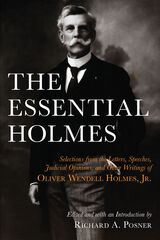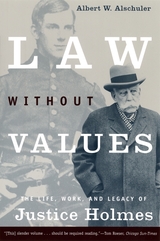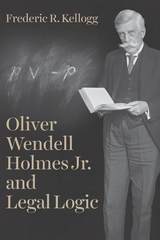
"A first-rate prose stylist, [Holmes] was perhaps the most quotable of all judges, as this ably edited volume shows."—Washington Post Book World
"Brilliantly edited, lucidly organized, and equipped with a compelling introduction by Judge Posner, [this book] is one of the finest single-volume samplers of any author's work I have seen. . . . Posner has fully captured the acrid tang of him in this masterly anthology."—Terry Teachout, National Review
"Excellent. . . . A worthwhile contribution to current American political/legal discussions."—Library Journal
"The best source for the reader who wants a first serious acquaintance with Holmes."—Thomas C. Grey, New York Review of Books

This bold book challenges a contemporary consensus on the titanic figure of Oliver Wendell Holmes. Holmes is the acknowledged source of twentieth-century tort law, but David Rosenberg takes sharp issue with the current portrayal of Holmes as a legal formalist in torts who opposed the notion of strict liability and dogmatically advocated a universal rule of negligence, primarily to subsidize industrial development. Marshaling the evidence found in Holmes' classic The Common Law and other writings, the author reveals that the opposite was the case, and, in the process, raises troubling questions about the present state of legal scholarship.
It was Holmes who founded the modern conception and justification of strict liability. He envisioned an expansive role for strict liability to augment the negligence rule in preventing and redressing injury from industrial activity. This recovery of Holmes' theory of torts provides new insights into the nature of the jurisprudence that launched the American legal realist movement, and also overturns standard interpretations of the history of tort law.
Rejecting the prevailing view that either strict liability or negligence reigned exclusively, Holmes and his contemporaries reconciled the existence of both rules, and advocated reforms of tort law to protect society from the unprecedented hazards of industrial life. The parallel drawn by the book between their response and ours in grappling with the novel problem of mass torts confirms Holmes' belief in the adaptive genius of the common law.


Conventional legal logic tends to focus on the role of judges in deciding cases. Holmes recognized input from outside the law—the importance of the social dimension of legal and logical induction: how opposing views of “many minds” may converge. Drawing on analogies from the natural sciences, Holmes came to understand law as an extended process of inquiry into recurring problems.
Rather than vagueness or contradiction in the meaning or application of rules, Holmes focused on the relation of novel or unanticipated facts to an underlying and emergent social problem. Where the meaning and extension of legal terms are disputed by opposing views and practices, it is not strictly a legal uncertainty, and it is a mistake to expect that judges alone can immediately resolve the larger issue.
READERS
Browse our collection.
PUBLISHERS
See BiblioVault's publisher services.
STUDENT SERVICES
Files for college accessibility offices.
UChicago Accessibility Resources
home | accessibility | search | about | contact us
BiblioVault ® 2001 - 2024
The University of Chicago Press









